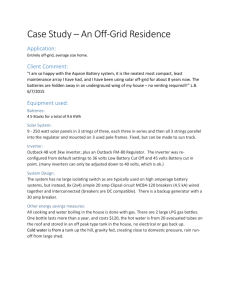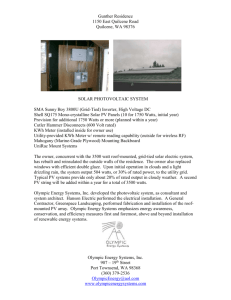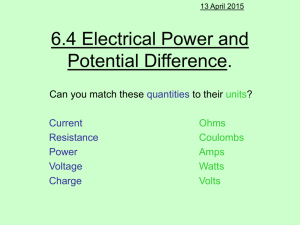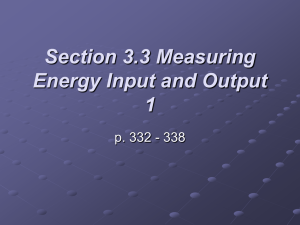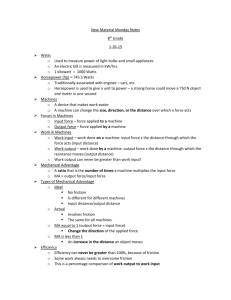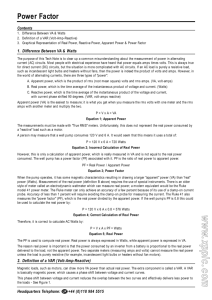Off-Grid System Sizing Calculator
advertisement
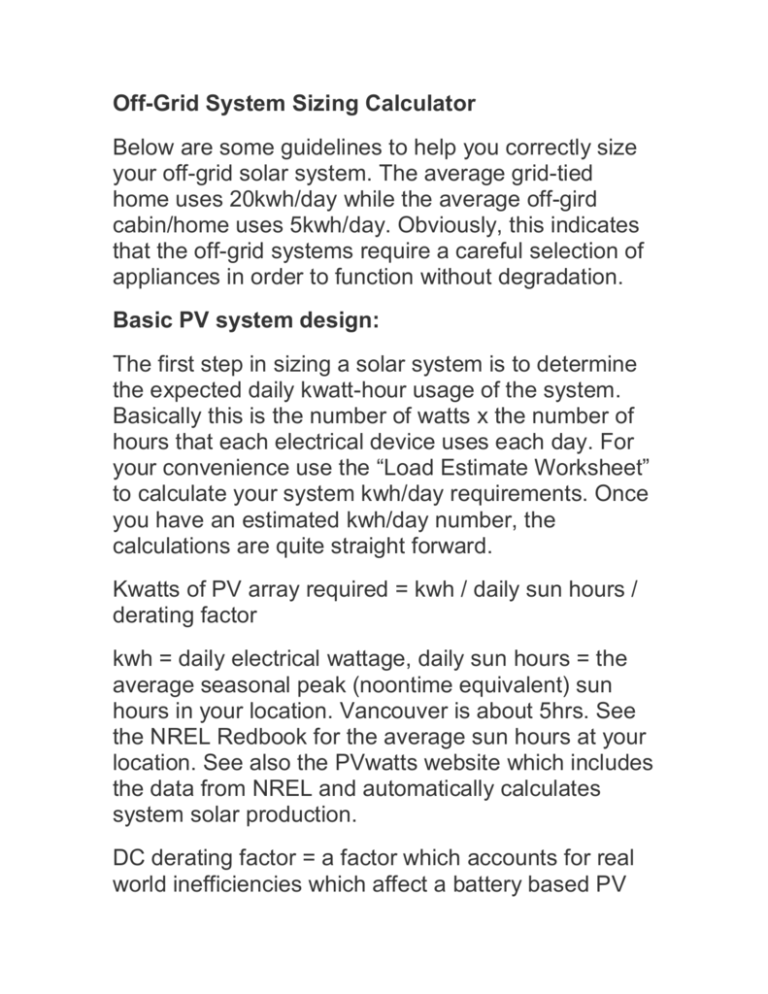
Off-Grid System Sizing Calculator Below are some guidelines to help you correctly size your off-grid solar system. The average grid-tied home uses 20kwh/day while the average off-gird cabin/home uses 5kwh/day. Obviously, this indicates that the off-grid systems require a careful selection of appliances in order to function without degradation. Basic PV system design: The first step in sizing a solar system is to determine the expected daily kwatt-hour usage of the system. Basically this is the number of watts x the number of hours that each electrical device uses each day. For your convenience use the “Load Estimate Worksheet” to calculate your system kwh/day requirements. Once you have an estimated kwh/day number, the calculations are quite straight forward. Kwatts of PV array required = kwh / daily sun hours / derating factor kwh = daily electrical wattage, daily sun hours = the average seasonal peak (noontime equivalent) sun hours in your location. Vancouver is about 5hrs. See the NREL Redbook for the average sun hours at your location. See also the PVwatts website which includes the data from NREL and automatically calculates system solar production. DC derating factor = a factor which accounts for real world inefficiencies which affect a battery based PV system (e.g., heat, humidity, bird droppings, wire losses, inverter losses, battery losses). Using a derating factor of .67 to .77 will result in a good safe estimate of the power that you will obtain from your system. Likely, your system output will be higher but it’s better to estimate a lower system output and be pleasantly surprised when your system produces a higher than expected output rather than be disappointed by poor performance. PV sizing example (How many solar panels do we need?): Now let’s try out the above formula using an example. Assuming your PV worksheet calculations show that your system will use 5kwh/day, and your average daily sun hours for your location is 5, and you plan to use 190 watt 24 volt panels, let’s do the math: 5kwh/5/.67 = 1.49 kw PV array (1,490 DC watts) 1490/190(watts/panel)=7.8 panels (round up to 8) 4 series strings of 2 panels = 8 modules with each string producing 48 volts Battery Bank Sizing: A battery bank is sized to produce electricity when the solar modules don’t produce optimum output. A good rule of thumb is to size the system to provide power for 3 to 5 days (days of autonomy). Using 3 days is a good number, while selecting 5 days may result in a battery bank that is quite expensive. Continuing with our example: We first need to convert watt-hours to amp-hours since that’s how batteries are rated: 5000 watt hours per day/24 (our system voltage) = 208 Amp hours required per day. You may want to increase this to keep from deeply cycling your batteries and extend their life. 208 amp-hours x 3 (days of autonomy) = 624 Ah @24 volts Solar charge controller sizing: The size of a charge controller is based on the PV array voltage, desired system battery voltage and the short circuit current of the solar panels. Make sure that the solar charge controller that you use has enough capacity to handle the current from the PV array. Power = Volts x Amps Here we know the power is 1490 watts, the battery bank is 24 volts, so: 1490 watts/26.6 volts= 56A In this case we could choose an 60 Amp MPPT Charge Controller. Inverter Sizing: To find the correct inverters size we first determine the AC watts that will be provided by the Inverter. Using our example of 1490 DC watts we can convert back to AC watts by multiplying by the derating factor that we used earlier. So AC system watts = 1490 x.67 = total system watts = 998 AC watts. Thus, an inverter capable of handling 1000 watts would work providing your loads do not exceed its capacity. A great choice for an off-grid inverter would be a 2000w true sine wave unit since it would provide some upside potential if you decide to add more solar panels in the future. Hours to Discharge Capacity as percent of 20 hr rating 20 100% 10 84% 5 67% 2 56% 1 47%
